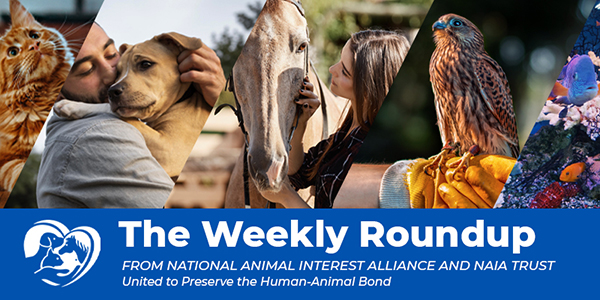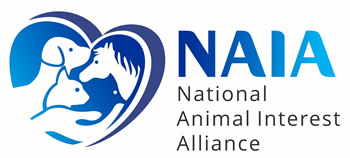
Inside This Issue:
- To Save Them, We Must Hasten Their Extinction
- Florida "Humane Lobby Day" Reminder that Hands-on Animal Experts Must Come Together
- Indiana House Bill 1412 Approved by Wide Margin, Moves on to Senate
- Animal Control Arrests and Watching the Watchers
To Save Them, We Must Hasten Their Extinction

Beluga Whale
A new federal bill, H 7145, and its Senate companion, S 3694, aims to ban captivity for some cetaceans in the United States. The SWIMS Act, or Strengthening Welfare in Marine Settings Act, of 2024 will “prohibit the taking, importation, exportation, and breeding of … orcas, beluga whales, false killer whales, and pilot whales.” The animals could only be rehabilitated and released, kept in enclosures that are as close as possible to their natural environment, no longer bred or artificially inseminated if put on public display, and no more permits for taking or importation would be granted.
The bill states that science has come to the conclusion that cetaceans suffer in human care and can no longer be held captive due to a wide range of stressors. What is really at stake here is dismantling marine parks that have cared for these creatures for decades and are the reason we have such detailed data on cetaceans. Years of up close and personal relationships with trainers, researchers, and veterinarians have given us libraries full of studies about social groups, communication, breeding, nutrition, and animal medicine that would be totally unknown to us otherwise. As it stands, no individuals from these species listed have been intentionally captured for public display since the 90s, and even then, those were other countries performing collections; it is not happening in American institutions. Today, rather than being caught, wild marine mammals are being rescued from beachings or cold stunning then off to be evaluated and rehabilitated. Aquariums and animal parks like SeaWorld must receive permission from NOAA to either release the animals or find them a permanent home if they are deemed unreleasable. If this bill were to pass it would make for a nice photo op and press release, but long term, it would make managing the conservation of these four whale species virtually impossible.
Schiff, Wyden, Huffman, and Delbane Introduce Legislation to End Future Capture and Breeding of Whales for Public Display
Resources
★ (Video) SeaWorld San Diego rescues entangled Humpback Whale off the coast of Carlsbad
★ How long do dolphins live? Survival rates and life expectancies for bottlenose dolphins in zoological facilities vs. wild populations
Florida "Humane Lobby Day" Reminder that Hands-on Animal Experts Must Come Together
Animal rights activists took to the halls of the Florida capitol last Monday to lobby state legislatures. Every session, large national activist organizations spend millions of donor dollars in an effort to get their special interests pushed through state assemblies and this year is no different. Once passed, these groups fundraise off their victories and they try to convince other states and cities to pass similar legislation.
It doesn't matter whether the legislation makes a meaningful change. For example, Ojai, California recently recognized "elephant rights" despite there being no elephants or pachyderm-related activities in the city. And very few jurisdictions that have enacted pet store bans over the last decade contained any pet stores that sold animals. It's about the numbers and setting precedent. About being able to ask legislators "Look at how many other forward-thinking cities have passed this type of legislation. Do you really want to be on the wrong side of history?"
Legislators have a genuine conundrum placed before them: vote on the side of science and hands-on expertise, or be painted as heartless abusers by multi-million dollar nonprofits. And nobody wants to be called a puppy kicker. Florida has been battling an onslaught of animal rights groups for years now. That said, countless animal experts call the Sunshine state their home, too: reptile breeders and keepers, exotic animal handlers, wildlife rehabbers, horse trainers, dog and cat fanciers, and countless others – hopefully these groups recognize their common interests and stand up together before it is too late.
Animal advocates gather for Humane Lobby Day at the Florida State Capitol
Resources
★ California city becomes first in nation to recognize elephant rights
★ Berkley bans sale of pets, current business will continue to operate
Indiana House Bill 1412 Approved by Wide Margin, Moves on to Senate

I need you to bring me the weirdest, most unsettling pet shop graphic you can find. Good enough.
Indiana House Bill 1412 was approved by a wide margin earlier this week, and now moves to the senate. The bill will require everyone who sells dogs to pet stores – be they breeders, rescues and shelters, care facilities, basically anyone – to register with the state’s board of animal health. Further, it requires pet stores to provide disclosures and warranties, as well as a 3-day, no-questions-asked return policy for dogs. It also establishes an inspection program for commercial dog breeders, brokers, and pet stores. On top of all that (and the part that sticks in the “adopt-don’t-shop” crowd’s craw), this bill bans pet store bans – that is, it tells animal activists they can no longer pass local-level laws forcing pet stores to only work with and sell animals from rescues.
While there is likely no such thing as a perfect bill, this one gets a lot of things right. For some, the heated language being used by the bill’s opponents (and who the opponents are) may even serve as a testament to just how on target it is. Oversight, clear standards and penalties, and transparency for consumers is, in our view, the most thoughtful – and ultimately humane – way of handling commodities that consumers desire. Referring to adorable, living creatures like puppies and kittens as “commodities” might sound a little cold, perhaps tasteless, but the fact of the matter is, people are going to find ways of getting them, regardless of how many “pet store bans” are passed. It makes far more sense to inspect and regulate the good actors while putting the bad ones out of business.
Aside: the headline of the article we’ve linked to brands the bill as “controversial” and puts the word “puppy mill” in quotes, while the lede works as a mildly worded summary of HSUS talking points. This sort of thing is usually a dead giveaway of the author’s views, and caused a powerful “Oh boy, here we go again” feeling to well up in us. But on the whole, the piece does a fair job of covering the arguments in favor of the bill, as well as against. It also mentions a pet store ban that was passed in a city that didn’t even have pet stores (few easier ways to score a legislative victory), so we have to give credit where it is due.
Controversial 'puppy mill' bill passes Indiana House
Resources
★ Indiana House Bill 1412
★ ‘A scare tactic’ House bill aims to ban cities from prohibiting pet shops
Animal Control Arrests and Watching the Watchers

Who's worth a lot? You are!
This week’s installment of “Who Watches the Watchmen?” features an animal control supervisor, Danielle Barnes, who is accused of plucking up purebred dogs from animal control, and then selling them from her own nonprofit – and making quite a profit along the way. She is also accused of using county resources for her nonprofit to vaccinate the dogs she sold, and of adding, then pocketing, a fee for county spay/neuter services. Other employees have been implicated in this scheme, too, leading to another arrest, with at least one more arrest expected. In addition, Barnes faces several other charges, most of them drug and fraud related.
These alleged crimes really speak to the demand for purebred dogs – and perhaps a shortage, as well. Getting a specific breed of dog from a reputable breeder can easily mean wait times of over a year, and then, even “common” popular breeds, like Labrador Retrievers will cost a prospective pet buyer at least $1,000 (and this is pretty low). If a nonprofit offers pet buyers a shorter wait, lower cost, and the right to say “I rescued my Lab,” that’s a pretty sweet deal! Of course a “sweet deal” doesn’t excuse theft, fraud, and harming the integrity of animal rescue. But it is easy to see why someone would exploit the demand for purebred dogs, and why oversight is necessary, even (and perhaps, especially) for “the good guys.”
Animal control supervisor implicated in large-scale puppy mill operation, police say
Resources
★ Animal control officer steals dog, tells owner it died — then sells it, NY cops say
★ Woman's frantic search for lost pet leads to termination of SC animal control officer, officials say
Also in the News...
★ Florida wildlife attraction slapped with $9K penalty after multiple animals escape enclosures (Rhino Escape; Not the First Escape)
★ Wildlife Wednesday: Wetland wildlife waits for warmer weather (Wildlife Education & Conservation; Surviving the Winter)
★ Cheektowaga woman faces animal cruelty charges after SPCA rescued over 150 animals from her property (Neglect, Cruelty, and a "No Animal" Order)
★ Red Sea attacks: Sheep and cattle left stranded off Australia's coast (Biosecurity; Quarantine; Unintended Casualties?)
★ Lifted carcass transportation restrictions help taxidermist (Probably Not Something You Think About Very Often)
★ Why Do Animals Have Different Pupil Shapes? (Evolution; It's Just Science)
★ Beef-on-Dairy: Why Feedlots Crave This Important Information (Dairy Farms; Cattle Crosses; Keeping Good Records)
Click here to see what is happening legislatively


